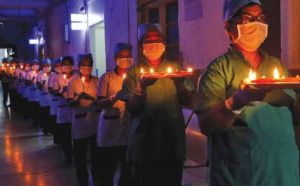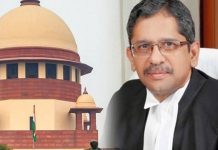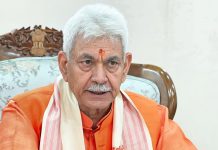 The unprecedented global crisis engendered in the wake of the outbreak of Coronavirus, also known as Covid-19, has already wreaked havoc and continues to do so in terms of claiming heavy toll of human lives and wrecking the global economy, including that of India as well. With more than 1.5 million people having been affected as on April 8, of which over 3 lakh people have recovered along with over 88, 000 having been succumbed to death worldwide and there is going to be unabated spike in these numbers as soon as more testing reports pour in each day.
The unprecedented global crisis engendered in the wake of the outbreak of Coronavirus, also known as Covid-19, has already wreaked havoc and continues to do so in terms of claiming heavy toll of human lives and wrecking the global economy, including that of India as well. With more than 1.5 million people having been affected as on April 8, of which over 3 lakh people have recovered along with over 88, 000 having been succumbed to death worldwide and there is going to be unabated spike in these numbers as soon as more testing reports pour in each day.
Covid-19 has already wreaked havoc in countries such as China, France, Germany, Iran, Italy, Japan, South Korea the United Kingdom, the United States and other countries, with thousands of deaths taking place along with insufficient medical facilities and pushing the global economy on the verge of collapse.
According to broad estimates, the global economy is likely to shrink by 1 per cent in 2020 owing to Covid-19 and it may even contract further if restrictions on the economic activities are extended without corresponding fiscal responses. Along with disruptions in global supply chains and international trade, the pandemic has also forced more than 100 countries worldwide to close their national borders in recent weeks thereby bringing movement of people, tourism, aviation and hospitality industries to a screeching halt since past few weeks.
Millions of workers in the pandemic-hit countries are facing the bleak prospect of losing their jobs; and it is heartening to note that concerned national governments are rolling out large stimulus packages to avert a sharp downturn of their economies that could probably plunge the global economy into a deep recession.
Impact on India
India is likely to pay a heavy price in terms of loss of human lives and economy due to Covid-19. As on the closing part of April 8, India had tested 167, 235 people of which nearly 6, 000 were affected cases, and of these 178 persons lost their lives and a little over 500 people had recovered thereby leaving the number of active cases more than 5, 000. Spike in cases is expected in coming days with increased testing.
The trends in spike in number of cases on daily basis during the past week presents a dismal picture. The number of new cases reported on April 2 stood at 545, on April 3 at 516 new cases, on April 4 at 529 new cases, on April 5 at 701 new cases, on April 6 at 489 new cases, on April 7 at 573 new cases and on April 8 the number of new cases reported stood at 565. In other words, on an average 500 new cases were reported daily between April 2 and April 8 and this trend is likely to continue in coming days if immediate preventive measures are not adhered to.
According to media reports, of the total about 6,000 Covid-19 positive cases reported till April 8 in India, nearly a third are related to the religious gathering at the Markaz, as the Jamaat headquarters is known, located in the Nizamuddin area of New Delhi. The government claimed more than 8,000 people, including foreigners, visited the headquarters in early March this year. While blaming the Jamaat leadership of “carelessness” during a global pandemic, experts and civil society members also accused the central government for its delayed response and allowing foreigners, particularly those coming from Covid-19 hotspot countries such as Malaysia and Indonesia, into India.
In the wake of mounting number of patients affected by this virus in India, various state governments are informing the citizens of precautionary measures such as maintaining social distance and sanitizing the means of public transport, to avoid a situation which could prove difficult to handle. Maharashtra, Tamil Nadu, Delhi, Kerala and Haryana along with UP are reported to the worst Covid-19-hit states where large number of positive cases as well as number of deaths have been reported in recent days.
The government of India had declared a nation-wide lock-down from March 24 to April 14 with a view to prevent the spread of the pandemic; nevertheless, massive number of positive cases as well as number of deaths have been reported in the first week of April, during the lockdown period.
Outbreak and sudden spurt in the Covid-19 positive cases in India has brought forth chinks in the armoury of health preparations and long-term fiscal planning in the country. There is a yawning gap in the availability of trained medical staff, testing kits, personal-protection-equipment (PPE), sanitisers and face-masks along with hospital beds and ventilators corresponding to the spike in positive cases. States’ demands for medical kits and fiscal help are being partially met by the Central Government for various reasons.
Despite these shortcomings, some states have shown exemplary courage in meeting the challenge of the pandemic. Government of Rajasthan aptly handled the Covid-19 in Bhilwara by adhering to strict administrative measures and harnessing available medical resources and it is now famous as Bhilwara Model. Besides, the state government has also enlisted private hospitals in the state to fight the epidemic and this has enhanced the capacity of the state with more isolation beds, ICU beds and ventilators etc. Similar measures are being adopted by various other state government like Delhi, UP, Maharashtra, MP, Tamil Nadu and other affected states. According to latest media reports, the government of UP has declared 104 Covid-19 hotspots across 15 districts and these areas will go under complete lockdown.
Government of Delhi has identified 20 Coronavirus hotspots across Delhi that are going to be sealed and wearing face mask has been made compulsory for the people coming out of their houses. Mumbai, Chandigarh, Nagaland and Odisha have also made wearing face mask compulsory for those stepping outside their homes. Covid-19 has affected globally and almost all states of the India Union are doing their best to combat with this pandemic within the means available with them. It also devolves on the people to abide by the instructions and directives issued by the authorities and strictly observe the lockdown.
Covid-19 and the resultant lockdown have together adversely impacted the India economy that has already been under stress. Goldman Sachs has forecast that India’s real GDP growth could fall to 1.6 percent in FY21 compared to its earlier projection of 3.3 percent. Besides, there has been a steep rise in the number of unemployed in India, especially during the lockdown period.
According to the latest data released by the Centre for Monitoring Indian Economy (CMIE), the Covid-19 may leave a devasting impact on the Indian economy, sending urban unemployment rate soaring to 30.9%, taking overall unemployment rate to 23.4%. Even prior to the outbreak of Covid-19, unemployment rate in India had reached its pinnacle, the worst in past 45 years.
A salutary impact of the pandemic crisis is that the Modi government has consulted the state CMs and Opposition parties for the first time since his taking over as Prime Minister in 2014 and asked for suggestions and cooperation to deal with the impending crisis.
The suggestions mooted by Sonia Gandhi, inter alia, include: suspension of 20,000-crore “Central Vista” project and utilize the same money to build new hospital infrastructure and diagnostics besides better equipping frontline Covid-19 workers; the government to make a “proportionate reduction of 30 per cent” in its own expenditure and use the funds to help migrant workers and others in the unorganised sector; put all foreign visits on hold and the amount thus saved (around 393 crores) can be extensively utilized in measures to combat Covid-19; a ban on TV, print and online media ads by the government for two years, with the exception of coronavirus-related information; and transfer of all the money under the “PM Cares” fund to the Prime Minister’s National Relief Fund to “ensure efficiency, transparency, accountability and audit”. .
Way forward
Unprecedented and unpredictable nature of the pandemic calls for integrated, holistic and non-partisan approach by taking all stakeholders on board irrespective of their political, social or religious affiliations. Present dispensation at the helm either at the Centre or in the various states owes an obligation to the people who have voted them to power. Interestingly, on the question of extending the lockdown period, many state chief ministers have accorded priority to the safety of the people arguing that economic recovery can be had once people are safe. These are testing times that will delineate between the statesmanship and showmanship.
letters@tehelka.com













